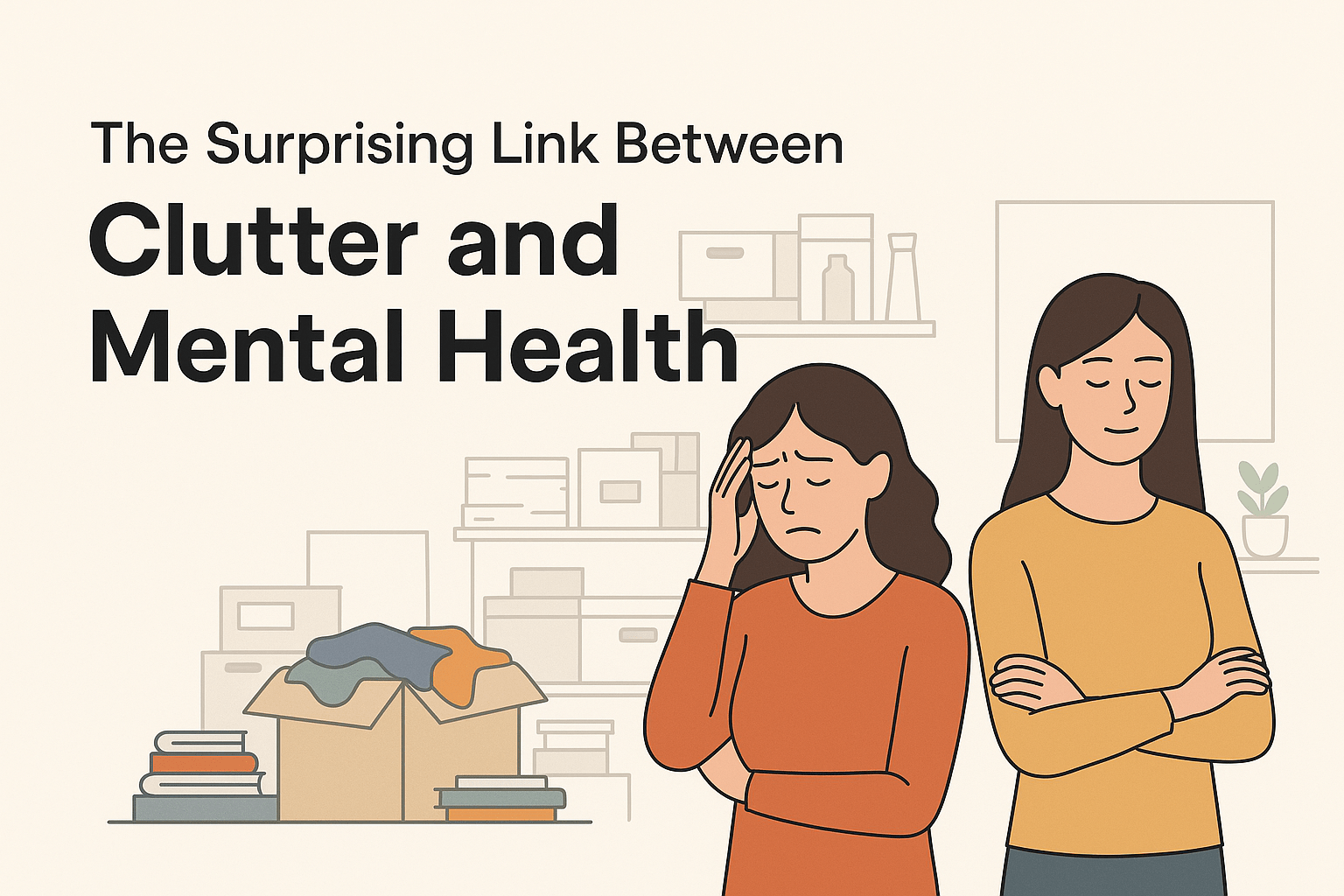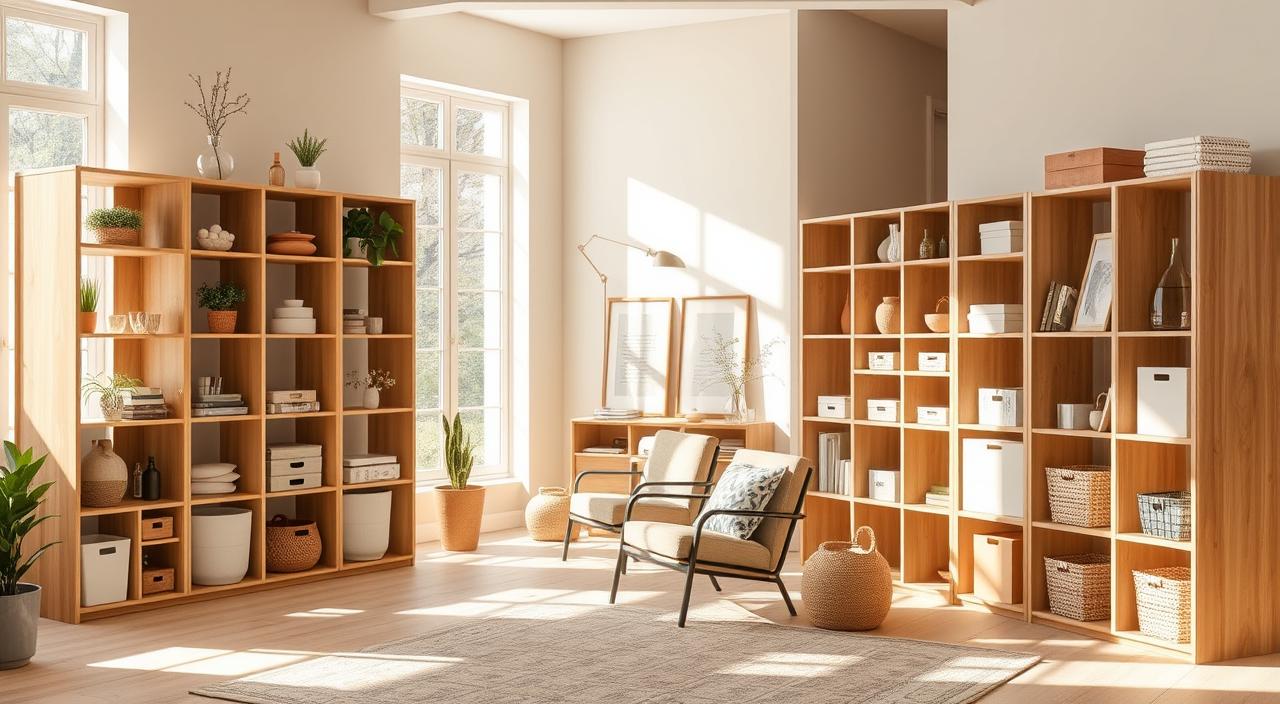
Clutter and mental health are more connected than many people realise. Walking into a messy room can trigger anxiety, reduce focus, and even disrupt sleep. Research shows that visual chaos competes for your brain’s attention, creating stress and lowering productivity.

By understanding how clutter impacts mental health, you can take steps to create calmer, more organised spaces that boost emotional well-being and cognitive performance.
Key Takeaways
- Clutter competes for brain attention, affecting focus and decision-making.
- Disorganised spaces can trigger cortisol spikes and elevate stress.
- Regular exposure to clutter can lead to disrupted sleep and mental fatigue.
- Creating organised environments improves mood, memory, and emotional regulation.
- Decluttering acts as a practical form of self-care for better psychological health.
The Science Behind Clutter and Mental Health
Researchers at University College London found that disorganised spaces activate the amygdala, the brain’s stress centre. This visual chaos is processed as a potential threat, leading to elevated cortisol levels and feelings of overwhelm.
If clutter is affecting your living space, professional services like house clearance in London can help restore order and peace of mind.
Cognitive Load from Messy Spaces
| Environment Type | Attention Span | Task Completion Accuracy |
|---|---|---|
| Minimalist workspace | 45 minutes | 92% |
| Cluttered workspace | 18 minutes | 67% |
| Moderately tidy space | 29 minutes | 78% |
As shown above, clutter reduces cognitive bandwidth and impacts performance.
Cortisol Spikes: The Hormonal Impact of Clutter
A UCLA study tracking families at home found that cortisol levels—a key stress hormone—increased significantly in cluttered environments. For mothers managing household mess, levels rose by an average of 27%.
| Clutter Level | Cortisol Increase | Memory Score (/100) |
|---|---|---|
| Organised space | 5–8% | 88 |
| Moderate clutter | 15–18% | 74 |
| Highly disorganised | 25–30% | 61 |
These biological responses explain why clutter often leads to poor concentration, mood swings, and even memory lapses.
How Clutter Affects Daily Life and Self-Esteem
Beyond biology, clutter affects how we feel about ourselves. A study published in the Journal of Environmental Psychology found a direct link between cluttered homes and lower life satisfaction. For many, mess becomes a source of shame or social withdrawal.
Social Isolation Linked to Home Disorganisation
| Social Activity | Tidy Homes | Cluttered Homes |
|---|---|---|
| Hosting friends monthly | 82% | 23% |
| Regular family gatherings | 67% | 34% |
| Kids’ playdates at home | 58% | 12% |
As mess accumulates, many people stop inviting guests, decline plans, or feel embarrassed during video calls. Addressing clutter can improve not just your environment, but your social confidence too.
Why Does Clutter Build Up? Common Psychological Triggers

If clutter is so stressful, why is it so common? The answer lies in psychology. Most people don’t accumulate items on purpose—it often results from hidden patterns:
- Procrastination: Delaying small tasks like sorting mail or laundry.
- Emotional attachment: Holding onto old clothes or gifts due to sentimental value.
- Lack of systems: No designated space for everyday items, leading to visual chaos.
Spotting these habits is the first step toward meaningful change.
Decluttering for Mental Health: Practical Tips
Transforming your space doesn’t require perfection—just progress. Start small and build momentum using techniques that support how your brain works.
Micro-Habits That Make a Big Impact
- Sort one drawer or shelf at a time.
- Spend just 5–10 minutes each evening on tidying.
- Use the “OHIO” method: Only Handle It Once—decide and act immediately on each item.
| Method | Average Completion Time | Reported Mental Fatigue |
|---|---|---|
| OHIO (One-Touch) | 75% faster | Low |
| Multi-handling | Slower progress | Higher fatigue |
Implement three decluttering bins labelled Keep, Donate, and Discard for quick decision-making.
Designing Organised Spaces to Support Emotional Wellness

Once decluttered, maintaining calm spaces is key to supporting your mental wellbeing.
Simple Storage Solutions That Help
- Hooks for keys near entrances
- Drawer dividers in kitchens and bedrooms
- Colour-coded bins for seasonal clothes or documents
Princeton researchers found that labelled systems reduce “decision fatigue” by up to 38%, allowing your brain to focus on more meaningful tasks.
Routine That Prevents Re-cluttering
Try a 10-minute nightly reset:
| Area | Time Spent | Benefit |
|---|---|---|
| Kitchen | 2 mins | Easier morning routines |
| Living Room | 3 mins | Reduced distractions |
| Bedroom | 5 mins | Better sleep quality |
These habits make tidiness second nature and reduce daily overwhelm.
Improving Productivity Through a Clear Workspace
Visual noise doesn’t just stress you out—it also impacts work output. According to research from MIT, cluttered workspaces can cut productivity by up to 75%.
Productivity by Workspace Type
| Desk Setup | Tasks/Hour | Error Rate | Stress Level |
|---|---|---|---|
| Clear Desk | 4 | 8% | Low |
| Mild Clutter | 2.7 | 19% | Medium |
| Very Messy Desk | 1.1 | 34% | High |
Set up a visual rest zone—a 60 cm area of clear space in your line of sight—to reset your focus. Consider using colour-coded trays for paperwork: red for urgent, blue for later.
Embracing Minimalism and Mindfulness for Long-Term Change
Mindful living goes hand-in-hand with tidy living. Minimalism isn’t about owning nothing—it’s about making space for what matters most.
Before You Buy, Ask:
- Do I truly need this?
- Where will it go?
- Does it reflect my values?
Apply the “one-in-one-out” rule: for every new item, remove one existing item.
| Shopping Habit | Items/Month | Storage Stress | Regret Rate |
|---|---|---|---|
| Impulse Buying | 12–15 | High | 63% |
| Mindful Shopping | 3–5 | Low | 17% |
Pair this with mindfulness habits like morning journaling, 5-minute breathwork, and digital detox hours to keep your mind as clear as your surroundings.
Real Stories: How Decluttering Changed Lives
A 2023 UK survey found that 84% of people who committed to decluttering experienced noticeable mental health improvements. Sarah, a Manchester resident, shared:
“Tidying my flat helped me feel in control again. I slept better, had more energy, and even started painting again.”
Reported benefits included:
- 72% saw better sleep
- 68% reported improved focus
- 61% felt more socially confident
Conclusion: A Tidy Space Is a Calm Mind
Our brains aren’t designed for clutter. Visual disorganisation triggers stress, drains focus, and can slowly erode our sense of peace. But small, consistent actions can reverse these effects—starting with a single shelf or drawer.
By understanding the science behind clutter and mental health, you can take meaningful steps to create a home that supports clarity, wellbeing, and joy. Tidy spaces are more than just “nice to have”—they’re essential tools for nurturing your mind.

 CALL NOW
CALL NOW